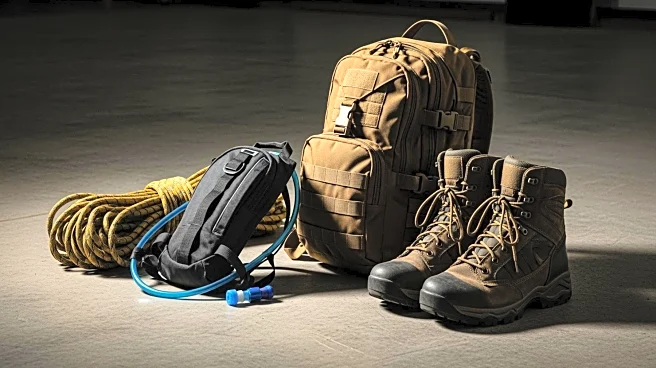Rapid Read • 8 min read
Israel has announced a temporary pause in military operations in Gaza, allowing for a ten-hour daily ceasefire in key population centers such as Gaza City, Deir al Balah, and Al-Mawasi. This decision comes amid increasing international criticism over the humanitarian crisis in the region, with reports of mass starvation and severe shortages of food and medical supplies. The World Health Organization and the U.N. World Food Program have highlighted the dire situation, noting that the hunger crisis has reached unprecedented levels. In response, Israel has coordinated with the U.N. and other humanitarian organizations to facilitate aid delivery, including airdrops of essential supplies like flour, sugar, and canned food. Additionally, secure routes have been established for aid trucks to distribute food and medicine across Gaza. Despite these efforts, tensions remain high, with accusations from Israel that Hamas is exacerbating chaos around aid distribution sites.
AD
The humanitarian pause in Gaza is a critical development in the ongoing conflict, as it addresses urgent needs for food and medical supplies among the besieged population. The international community has been vocal in its criticism of the restrictions on aid, and this move by Israel may help alleviate some of the immediate suffering. However, the situation remains complex, with over 1,000 Palestinians reportedly killed while attempting to access food since May. The U.S. has withdrawn from recent ceasefire talks, citing a lack of cooperation from Hamas, which complicates efforts to reach a long-term resolution. The humanitarian crisis in Gaza not only affects the local population but also has broader implications for regional stability and international relations.
The continuation of the daily ceasefire and the effectiveness of aid distribution will be closely monitored by international organizations and governments. The U.S. and other stakeholders may explore alternative diplomatic or humanitarian strategies to address the crisis. The potential for renewed negotiations or changes in military strategy could impact the situation on the ground. Additionally, the response from Hamas and other local actors will be crucial in determining the success of these humanitarian efforts.
The humanitarian crisis in Gaza raises significant ethical and legal questions about the conduct of war and the responsibilities of occupying powers. The role of international organizations in conflict zones and the challenges of delivering aid in hostile environments are also highlighted. Long-term, the situation may influence global humanitarian policies and the international community's approach to similar crises.
AD
More Stories You Might Enjoy











